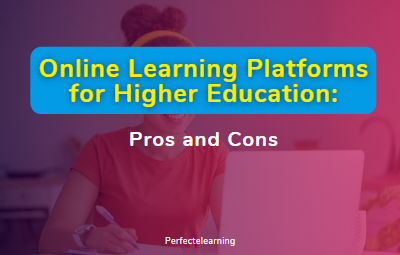

Online learning has become a popular alternative to traditional classroom learning, especially in higher education. With the many benefits and conveniences it offers, online learning has opened doors to many who may have been unable to pursue a degree through traditional means. However, online learning also has its drawbacks that must be considered before making the decision to enroll in an online course.
What are Online Learning Platforms?
Online learning platforms are virtual environments that allow students to access coursework and materials online. These platforms typically include features such as video lectures, online quizzes, discussion forums, and interactive learning tools. Online learning platforms are typically designed to be user-friendly, accessible from anywhere with an internet connection, and provide students with the flexibility to learn at their own pace.
The Pros of Online Learning Platforms
1.Convenience and Flexibility: One of the most significant benefits of online learning platforms is the convenience and flexibility they offer. With online courses, students can complete their coursework at their own pace, on their own time, and from anywhere with an internet connection. This is particularly beneficial for those who work full-time or have other responsibilities that make it difficult to attend traditional in-person classes.
2.Lower Costs: Another benefit of online learning platforms is that they often have lower costs than traditional in-person classes. This is because online courses do not require the same overhead expenses as traditional classrooms, such as building maintenance and utilities. Additionally, many online courses offer digital textbooks and other materials, which can be significantly less expensive than traditional textbooks.
3.More Course Options: Online learning platforms also offer students access to a wider range of course options. With online courses, students can choose from a variety of subjects and programs that may not be available at their local colleges or universities. This can be particularly beneficial for students who live in rural areas or who are unable to travel to attend in-person classes.
4.Accessible Learning Environment: Finally, online learning platforms provide an accessible learning environment for students with disabilities or other special needs. Online courses can be designed to be accessible to students with visual, auditory, or physical impairments, which can help ensure that all students have access to the same educational opportunities.
The Cons of Online Learning Platforms
1.Limited Interaction: One of the main drawbacks of online learning platforms is that they often provide limited interaction between students and instructors. Online courses typically rely on discussion forums and other online communication tools to facilitate interaction between students and instructors, which may not be as effective as in-person interaction.
2.Lack of Motivation and Discipline: Another disadvantage of online learning platforms is that they may require more motivation and discipline than traditional in-person classes. Online courses require students to be self-motivated and disciplined enough to complete coursework on their own time,
3.Technical Difficulties: Online learning platforms are reliant on technology and internet connectivity. Technical difficulties such as slow internet speeds, computer malfunctions, or software compatibility issues can impact the student's ability to access course materials, participate in online discussions, or complete assignments on time. These technical difficulties can be a significant disadvantage for students who do not have access to high-speed internet or the latest technology.
Conclusion
Online learning platforms for higher education have many benefits, such as convenience, flexibility, lower costs, more course options, and accessibility. However, they also have some disadvantages, such as limited interaction, lack of motivation and discipline, and technical difficulties. Before enrolling in an online course, students must carefully consider both the advantages and disadvantages to determine if online learning is the right choice for them.
Frequently Asked Question (FAQs)
Q: Are online courses more affordable than traditional in-person courses?
A: Yes, online courses are often more affordable than traditional in-person courses due to lower overhead expenses.
Q: How do online courses provide interaction between students and instructors?
A: Online courses typically rely on discussion forums and other online communication tools to facilitate interaction between students and instructors.
Q: Do online courses offer the same educational opportunities as traditional in-person courses?
A: Yes, online courses offer the same educational opportunities as traditional in-person courses, but they require students to be more self-motivated and disciplined.
Q: What are some technical difficulties that students may encounter with online learning platforms?
A: Technical difficulties such as slow internet speeds, computer malfunctions, or software compatibility issues can impact the student's ability to access course materials, participate in online discussions, or complete assignments on time.


